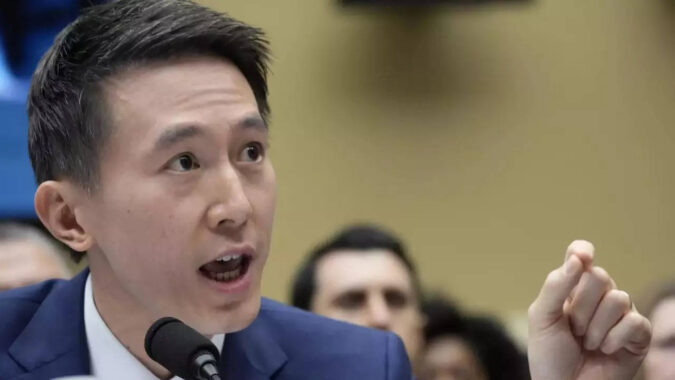US lawmakers at a congressional hearing on Thursday accused TikTok of serving harmful content and inflicting “emotional distress” on young users, grilling the Chinese-owned app‘s CEO on the company’s outsized influence on teens.
The hearing, which was TikTok Chief Executive Shou Zi Chew‘s first appearance before Congress, comes at a critical moment for the wildly popular video app that is owned by ByteDance, a Chinese tech company. Lawmakers are pressuring the Biden administration to ban the app from the country.
US lawmakers from both sides of the aisle quizzed Chew on whether American user data could be accessed by the Chinese government, but also demanded he address examples of harmful content posted on the app.
Rep. Cathy McMorris Rodgers, a Republican from Washington, kicked off the hearing saying that within minutes of creating an account on TikTok, the content algorithm promotes self-harm and eating disorder content, and encourages “dangerous” challenges that can put kids’ lives at risk.
Like other social media platforms, TikTok has long faced scrutiny over its policing of content on the app. The Center for Countering Digital Hate, a nonprofit that fights hate speech and disinformation, said in a December report that TikTok can “bombard” kids as young as 13 with eating disorder and self-harm content.
Similarly, Eko, a corporate accountability group, said its research found hashtags on TikTok that included suicide content had racked up over a million posts and 8.8 billion views.
Rep. Frank Pallone, a Democrat from New Jersey, said content on TikTok “exacerbated feelings of emotional stress” in children.
Chew testified that while the “vast majority” of TikTok users are over the age of 18, the company has invested in measures to protect young people who use the app.
Pew Research Center said 67% of US teens ages 13 to 17 use TikTok, and 16% of all teens say they use the app almost constantly.
TikTok has rolled out more parental control tools recently, and earlier this month said it was in the early stages of developing a feature that would let parents block their teens from seeing videos that contain certain words or hashtags.
Rep. Bob Latta, Republican from Ohio, spoke during the hearing of a 10-year-old girl who suffocated herself doing a so-called “blackout challenge” from videos posted on the app.
Latta said TikTok should not be protected by Section 230 of the Communications Decency Act of 1996, a law that generally gives online platforms immunity for content generated by users.
Chew said such incidents were “devastating” and that dangerous challenges were prohibited from TikTok.
The hearing, which was TikTok Chief Executive Shou Zi Chew‘s first appearance before Congress, comes at a critical moment for the wildly popular video app that is owned by ByteDance, a Chinese tech company. Lawmakers are pressuring the Biden administration to ban the app from the country.
US lawmakers from both sides of the aisle quizzed Chew on whether American user data could be accessed by the Chinese government, but also demanded he address examples of harmful content posted on the app.
Rep. Cathy McMorris Rodgers, a Republican from Washington, kicked off the hearing saying that within minutes of creating an account on TikTok, the content algorithm promotes self-harm and eating disorder content, and encourages “dangerous” challenges that can put kids’ lives at risk.
Like other social media platforms, TikTok has long faced scrutiny over its policing of content on the app. The Center for Countering Digital Hate, a nonprofit that fights hate speech and disinformation, said in a December report that TikTok can “bombard” kids as young as 13 with eating disorder and self-harm content.
Similarly, Eko, a corporate accountability group, said its research found hashtags on TikTok that included suicide content had racked up over a million posts and 8.8 billion views.
Rep. Frank Pallone, a Democrat from New Jersey, said content on TikTok “exacerbated feelings of emotional stress” in children.
Chew testified that while the “vast majority” of TikTok users are over the age of 18, the company has invested in measures to protect young people who use the app.
Pew Research Center said 67% of US teens ages 13 to 17 use TikTok, and 16% of all teens say they use the app almost constantly.
TikTok has rolled out more parental control tools recently, and earlier this month said it was in the early stages of developing a feature that would let parents block their teens from seeing videos that contain certain words or hashtags.
Rep. Bob Latta, Republican from Ohio, spoke during the hearing of a 10-year-old girl who suffocated herself doing a so-called “blackout challenge” from videos posted on the app.
Latta said TikTok should not be protected by Section 230 of the Communications Decency Act of 1996, a law that generally gives online platforms immunity for content generated by users.
Chew said such incidents were “devastating” and that dangerous challenges were prohibited from TikTok.
